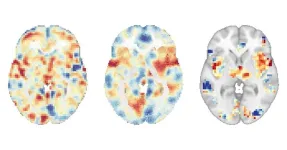(Press-News.org) Dallas, September 5, 2024 – The growing legal use of recreational and medical cannabis has generated an increased concern for potential side effects from long-term use, particularly regarding problems with memory and sleep. Until now, the effect of cannabis use on sleep and on memory have only been studied separately. Research led by Francesca Filbey, PhD, from the Laboratory of Neuroimaging of Reward Dynamics at The University of Texas at Dallas’ Center for BrainHealth®, in collaboration with a team from the University of Amsterdam, aimed to fill this gap by testing how sleep impacts memory among cannabis users.
The study, “The role of sleep in the link between cannabis use and memory function: evidence from a cross-sectional study” was recently published in The American Journal of Drug and Alcohol Abuse.
A total of 141 adults with cannabis use disorder (CUD, defined as using cannabis regularly, more than 5 days per week during the past year) and 87 non-current users participated in this study.
Participants self-reported their frequency of sleep problems within the past week and completed a variety of cognitive assessments that tested their verbal memory, visuospatial learning and memory performance.
Results revealed that the CUD group reported more sleep problems than the non-CUD group, and that this contributed to visuospatial memory problems as well. There was no difference between the two groups in verbal memory performance.
Lead author Tracy Brown, a UT Dallas psychology PhD student in Dr. Filbey’s lab, stated, “Although sleep is one of the primary reasons people use cannabis, our findings suggest that long-term cannabis use actually results in poorer sleep, which is associated with poorer memory. These findings are useful to inform the consumers, clinicians and policymakers about the therapeutic considerations for cannabis, particularly regarding its use as a sleep aid.”
He added, “For researchers, this study points to the importance of analyzing sleep when evaluating the effects of cannabis on brain health.”
This research was supported by grant 1R01 DA042490 from the National Institute on Drug Abuse/National Institute of Health.
END
Center for BrainHealth investigates the relationship between cannabis use, sleep and memory
Sleep difficulties were associated with poorer memory performance
2024-09-05
ELSE PRESS RELEASES FROM THIS DATE:
K-State researchers determine molecular interactions in plants
2024-09-05
Plant scientists have long known that phosphorus is a crucial component in plant growth. A major discovery by a K-State biologist and her lab is leading to a better understanding of how plants detect and use that resource — potentially leading to more efficient production of crops for food, fiber and fuel.
A team of researchers led by Kathrin Schrick, associate professor of biology, recently published this research in New Phytologist, a high-impact journal in the plant sciences.
Schrick's lab focused on a specific transcription factor that regulates gene expression during development. They discovered a new kind of molecular interaction between the ...
Study estimates home blood pressure devices don’t fit properly for more than 17 million US adults
2024-09-05
Over-the-counter blood pressure measuring devices offer a simple, affordable way for people to track hypertension at home, but the standard arm-size ranges for these devices won’t appropriately fit millions of U.S. consumers, according to a new study from researchers at the Johns Hopkins Bloomberg School of Public Health.
The researchers compared standard arm cuff size ranges for popular retail automatic blood pressure measuring devices to arm circumference data from U.S. government-sponsored national ...
Brain scans reveal that mindfulness meditation for pain is not a placebo
2024-09-05
Pain is a complex, multifaceted experience shaped by various factors beyond physical sensation, such as a person’s mindset and their expectations of pain. The placebo effect, the tendency for a person’s symptoms to improve in response to inactive treatment, is a well-known example of how expectations can significantly alter a person’s experience. Mindfulness meditation, which has been used for pain management in various cultures for centuries, has long been thought to work by activating the placebo response. However, scientists have now ...
Cancer research in space for life on earth
2024-09-05
WINSTON-SALEM, N.C. – September 5, 2024 — The Wake Forest Institute for Regenerative Medicine (WFIRM) is honored to announce its selection for a pioneering cancer research project that will take place aboard the International Space Station (ISS). The project, one of only five chosen through a competitive solicitation by the ISS National Lab in partnership with NASA, aims to explore the effects of microgravity on cancer development and treatment.
The project, led by Dr. Shay Soker, focuses on the use of organoids—miniature, simplified versions of organs grown in the lab from cells recovered from colorectal cancer patients. ...
Research spotlight: Radiology test can be used to diagnose immune checkpoint inhibitor-associated acute kidney injury
2024-09-05
How would you summarize your study for a lay audience?
Immune checkpoint inhibitors (ICIs) are a class of immunotherapy that have revolutionized the treatment of cancer. However, they can cause a wide variety of autoimmune toxicities, including immune checkpoint inhibitor-associated acute kidney injury (ICI-AKI). Differentiating ICI-AKI from acute kidney injury (AKI) due to alternative causes, which are common in cancer patients, is challenging without a kidney biopsy due to the risk of bleeding for some patients.
In this study, we ...
Rice’s Aryeh Warmflash awarded $1.6M NIH grant for research on early human development
2024-09-05
Researchers at Rice University are working to understand how a single cell evolves into the complex network of specialized cells that form the human body. Funded by a $1.6 million grant from the National Institutes of Health, the research team’s new study could advance our knowledge of developmental disorders and contribute to the future of regenerative medicine.
Led byAryeh Warmflash, an associate professor of biosciences and Cancer Prevention and Research Institute of Texas Scholar in cancer ...
Researchers make mouse skin transparent using a common food dye
2024-09-05
Seeing what’s going on inside a body is never easy. While technologies like CT scans, X-rays, MRIs, and microscopy can provide insights, the images are rarely completely clear and can come with side effects like radiation exposure.
But what if you could apply a substance on the skin, much like a moisturizing cream, and make it transparent, without harming the tissue?
That’s what Stanford scientists have done using an FDA-approved dye that is commonly found in food, among several other light-absorbing molecules that exhibit similar effects. Published in Science on ...
Groundwater use can be accurately monitored with satellites using OPENet, new study finds
2024-09-05
Drought is a widespread concern in the Western U.S., and water managers across the region are developing groundwater management plans to conserve the essential resource. Groundwater is often pumped to the surface to irrigate crops, and meters that measure the flow of pumped water have historically offered the best information on groundwater use. These meters are rare, however, so DRI scientists set out to determine whether OpenET, a platform that measures evapotranspiration using satellite data, could help fill this information gap.
The new study, published August 8th in a special issue of Agricultural Water Management, compared groundwater meter ...
New technology could lead to alternative treatments for antibiotic-resistant bacteria
2024-09-05
SAN FRANCISCO—As antibiotic resistance becomes an increasingly serious threat to our health, the scientific and medical communities are searching for new medicines to fight infections. Researchers at Gladstone Institutes have just moved closer to that goal with a novel technique for harnessing the power of bacteriophages.
Bacteriophages, or phages for short, are viruses that naturally take over and kill bacteria. Thousands of phages exist, but using them as treatments to fight specific bacteria has so far proven to be challenging. To optimize phage therapy and make it scalable to human disease, scientists need ways to engineer phages into efficient bacteria-killing machines. This would ...
Research shows queen conch populations in marine reserves replenish populations beyond the reserve in The Bahamas
2024-09-05
A new study published in Conservation Science and Practice uncovers how breeding populations of queen conch (Aliger gigas) within a protected marine reserve, where fishing is prohibited, sustain populations beyond the borders of the reserve. This research, based on surveys conducted in The Bahamas by Shedd Aquarium and Bahamian partners, identifies where additional protections could help to ensure the survival of future queen conch generations.
In The Bahamas, queen conch is an economic and cultural ...
LAST 30 PRESS RELEASES:
Mayo Clinic study finds single dose of non-prescribed Adderall raises blood pressure and heart rate in healthy young adults
Engineered immune cells show promise against brain metastases in preclinical study
Improved EV battery technology will outmatch degradation from climate change
AI cancer tools risk “shortcut learning” rather than detecting true biology
Painless skin patch offers new way to monitor immune health
Children with poor oral health more often develop cardiovascular disease as adults
GLP-1 drugs associated with reduced need for emergency care for migraine
New knowledge on heritability paves the way for better treatment of people with chronic inflammatory bowel disease
Under the Lens: Microbiologists Nicola Holden and Gil Domingue weigh in on the raw milk debate
Science reveals why you can’t resist a snack – even when you’re full
Kidney cancer study finds belzutifan plus pembrolizumab post-surgery helps patients at high risk for relapse stay cancer-free longer
Alkali cation effects in electrochemical carbon dioxide reduction
Test platforms for charging wireless cars now fit on a bench
$3 million NIH grant funds national study of Medicare Advantage’s benefit expansion into social supports
Amplified Sciences achieves CAP accreditation for cutting-edge diagnostic lab
Fred Hutch announces 12 recipients of the annual Harold M. Weintraub Graduate Student Award
Native forest litter helps rebuild soil life in post-mining landscapes
Mountain soils in arid regions may emit more greenhouse gas as climate shifts, new study finds
Pairing biochar with other soil amendments could unlock stronger gains in soil health
Why do we get a skip in our step when we’re happy? Thank dopamine
UC Irvine scientists uncover cellular mechanism behind muscle repair
Platform to map living brain noninvasively takes next big step
Stress-testing the Cascadia Subduction Zone reveals variability that could impact how earthquakes spread
We may be underestimating the true carbon cost of northern wildfires
Blood test predicts which bladder cancer patients may safely skip surgery
Kennesaw State's Vijay Anand honored as National Academy of Inventors Senior Member
Recovery from whaling reveals the role of age in Humpback reproduction
Can the canny tick help prevent disease like MS and cancer?
Newcomer children show lower rates of emergency department use for non‑urgent conditions, study finds
Cognitive and neuropsychiatric function in former American football players
[Press-News.org] Center for BrainHealth investigates the relationship between cannabis use, sleep and memorySleep difficulties were associated with poorer memory performance





